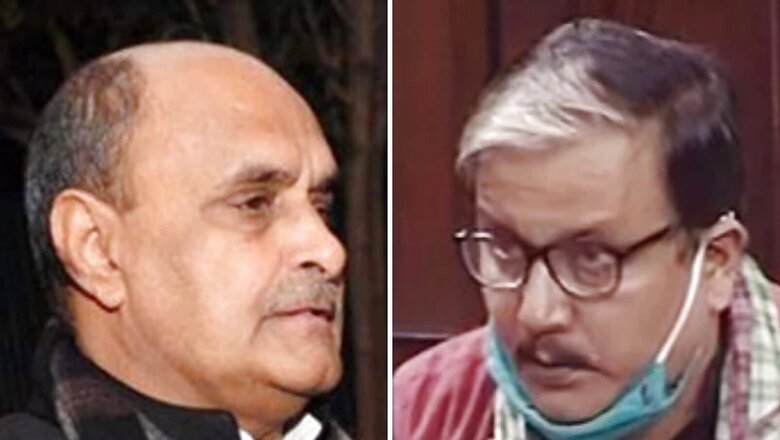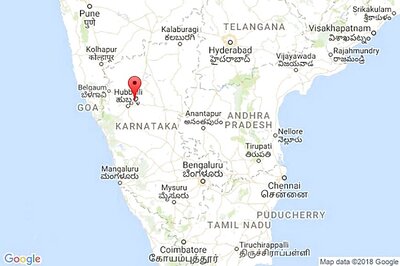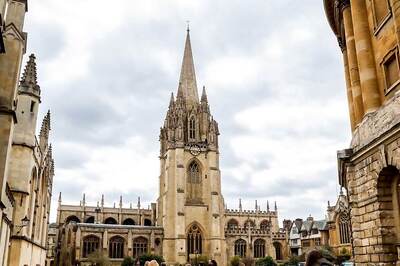
views
The demand for a caste-based census goes above and beyond electoral politics, RJD leader Manoj Kumar Jha and JD(U) leader KC Tyagi told News18.com in an exclusive joint interview. They added that the exercise is necessary to gauge which sections have benefitted in the 75 years since Independence.
Jha, a Rajya Sabha MP, said the central government is refusing to go for caste-based census since the numbers would bolster demands for reservation in the private section. Former Rajya Sabha member Tyagi, meanwhile, scoffed at views that such a census would fuel caste-ism.
Edited excerpts:
The government affidavit says that the Socio Economic and Caste Census (SECC) is unfeasible due to administrative reasons…
Manoj Jha: If the government of the day tells you that it is not feasible to hold such an exercise then it is a classic case of double speak. At the onset, did we think we would be able to vaccinate so many people? And particularly on Prime Minister’s birthday, record dosages were achieved… The same government says caste-based census is not feasible.
KC Tyagi: We are very worried and concerned. How can the caste-based census be dismissed for being unfeasible? The National Register of Citizens (NRC) was feasible? It was a large-scale exercise, everything about every person in Assam was checked; their house number, birth date, jobs etc. Papers were produced… all that was feasible?
The government has cited the 1951 policy in the affidavit. It states: “Caste-wise enumeration in the census has been given up as a matter of policy from 1951 onwards. In pursuance of this policy decision, castes other than SCs and STs have not been enumerated in all the Census since 1951…” Does this suffice as a determining factor to not disclose data?
Manoj Jha: In the affidavit, they also cited non-enumeration of castes as conscious decision since 1951. What conscious decision is this? Doesn’t the nation state evolve over a period? At the time this policy was decided, the country was only four years old. It is now 75 years old. Shouldn’t the citizens know who benefitted in these seven decades and what has been the trajectory of development, who got at the cost of whom? Every report tells you that inequality in this country is on the rise and it will be an unbridgeable gap.
KC Tyagi: All these justifications are stemming from anti-Backwards mindset. The first census in 1931 was an exercise in colonial rule and feudal society. A lot has happened since then. There were socially and emotionally injured backward castes that associated with upper caste identity for acceptability; like Kalyan Singh’s Lodh Rajput or Nitish Kumar’s Kurmi Kshatriya Sabha. After 75 years of independence, the country and civil society needs to know what happened in terms of empowerment of the socially backward.
Why do you think there is denial through the affidavit?
Manoj K Jha: The government is brazenly lying about the non-enumeration of OBCs because they are afraid of the numbers as it will not simply be numbers but explain the human tragedy behind them.
It is the highest stage of affirmative action which will disturb the status quo. Noise is expected. Look at our entire reservation system which gets legitimacy from the Constitution. It gives reservations to the backwards, SCs and STs in public employment. Now tell me, where is the public employment? The government is going for privatisation, the oppressed will lose jobs. So we need reservation in the private sector. There is data available on how private sector should reflect the diversity of this country. It should have basic minimum representation.
KC Tyagi: The percentage of Backwards is going to be over 55%, which will then lead to the demand to remove the 50% reservation ceiling. There will be a rejig. The new data will pave the way for a new leadership, and from this section will rise new entrants in judiciary and bureaucracy. Not all will be happy with this.
Look at the impact of the new economic policy. There has been increased disinvestment and the government is pursuing a public-private partnership model that does not go in favour of the employment of the backwards. There are still vacant seats in reserved sections of public-funded universities. With disinvestment, there will be demand for reservations in private sector.
There is OBC reservation in all-India quota medical seats. The states have got the power to decide the OBC lists. But caste-based census is seen as promoting caste-ism…
Manoj K Jha: There are two ways to look at it. One is symbolism and the other is substantial. This government is master craftsman of symbolism, but a hollow one. The OBC reservation in all-India quota was not charity by this government, it was long-pending. Every time there is an expansion of ministry dossier, the OBC castes get talked about. All of this is good for symbolism, but for meaningful impact, there needs to be caste-based census.
KC Tyagi: Caste-based census will encourage caste-ism? Really? Every time you get an OBC person in the cabinet, there are hoardings all over talking about how many OBCs there are in the cabinet. Caste-ism is the cement base. It is there, but if we want to remove it, it will lead to caste-ism? This country had a judge who, in the Bhanwari Devi rape case, said how can a Brahmin rape a Dalit, she is untouchable…
How do you think the denial of disclosure will impact the BJP, especially with many assembly elections around the corner? What does it mean for the NDA in Bihar?
Manoj K Jha: I do not want to link census to elections. The demand is coming from across party lines. It is not a partisan demand. It is being made in the spirit of the Preamble… “We the people of India”. Let’s see it as BR Ambedkar’s fight against graded inequality, which is the product of the Indian caste system. One has to look at it politically only in larger context, where power is about retaining power for some people. RJD is here to empower the powerless.
KC Tyagi: In the coming months, five states will be going to the polls. I am worried. With regards to Uttar Pradesh, let me remind you that it was a special corner for the social justice movement.
This government has seen the data on how OBCs voted for the BJP in different states and general elections. In Bihar, the Backwards are divided into two parts — one is dominated by Lalu Prasad Yadav, and second, which is the weaker section, is led by Nitish Kumar. But in UP, there is no such thing. There is a non-Yadav fluctuating vote that can benefit SP and BSP due to the denial to disclose caste-census data.
Remember the Jayaprakash Narayan movement when no one thought the Congress could be ousted. But what happened ultimately? The BJP government must learn from that episode and not test the janta. There are many people here who see this caste-based census as Mandal 2.0. There is fear because today nobody can question the Mandal Commission. Rajiv Gandhi drank six glasses of water in the House when he delivered the speech opposing the Mandal Commission report. Us din ki mari, Congress abhi tak zinda nahi hui hai (Congress has still not recovered from the blow).
What do you have to say about the sub-categorisation of OBCs happening in the absence of census data?
Manoj K Jha: Sub-categorisation is a funny exercise! Do you have complete data to hold this exercise? This is all being done based on myths and WhatsApp forwards. I think they need sound advisors, and should look for anthropologists who can help in the exercise for a caste-based census. The Mandal Commission was guided by anthropologists. Who calls himself Sharma in a district? That’s basic, and an anthropologist would know.
KC Tyagi: The Justice Rohini Commission got so many extensions. It reflects the anti-backwards mindset. The study of the 27% quota among OBCs should be made public.
Read all the Latest News , Breaking News and IPL 2022 Live Updates here.



















Comments
0 comment